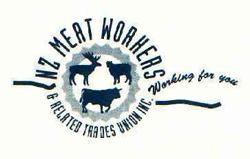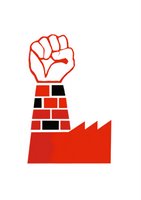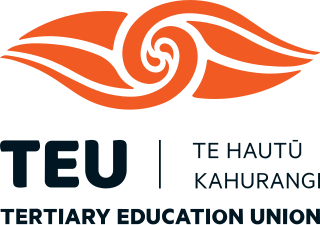A trade union or labor union, often simply referred to as a union, is an organization of workers whose purpose is to maintain or improve the conditions of their employment, such as attaining better wages and benefits, improving working conditions, improving safety standards, establishing complaint procedures, developing rules governing status of employees and protecting and increasing the bargaining power of workers.

The American Federation of Labor was a national federation of labor unions in the United States that continues today as the AFL–CIO. It was founded in Columbus, Ohio, in 1886 by an alliance of craft unions eager to provide mutual support and disappointed in the Knights of Labor. Samuel Gompers was elected the full-time president at its founding convention and was re-elected every year except one until his death in 1924. He became the major spokesperson for the union movement.

Socialism in New Zealand had little traction in early colonial New Zealand but developed as a political movement around the beginning of the 20th century. Much of socialism's early growth was found in the labour movement.

The Amalgamated Engineering Union (AEU), originally known as the Amalgamated Society of Engineers, was an Australian trade union which existed between 1852 and 1973. It represented engineers, as well as some other metal trades workers.
The Fiji Trades Union Congress (FTUC) is a trade union organisation in Fiji that was founded in 1952 under the leadership of Pandit Ami Chandra as the Fiji Industrial Workers Congress (FIWC). As the FIWC the organisation was the third federation in Oceania, after the Australian Council of Trade Unions and the New Zealand Council of Trade Unions, to join the International Confederation of Free Trade Unions. In 1975 the FTUC's membership was 25,000. The FTUC is affiliated to the International Trade Union Confederation. It has a close relationship with the Fiji Labour Party. The FTUC has 30 trade union affiliates, covering the public and private sectors. Major affiliates include: the Fiji Public Service Association, the Fiji Teachers Union, the Fiji Sugar & General Workers Union, the National Union of Hospitality, Catering & Tourism Industries Employees and the National Union of Factory and Commercial Workers Union.

The Association of Staff in Tertiary Education (ASTE) was a national trade union in New Zealand. In 2009 it merged with Association of University Staff (AUS) to become the New Zealand Tertiary Education Union Te Hautu Kahurangi o Aotearoa. ASTE was formed in 1988 by the merger of the Teacher Colleges Association (TCA), and the NZ Association of Polytechnic Teachers (NZAPT). The majority of members were from polytechnics. However, it retained coverage of the academic staff at the Auckland University of Technology (AUT) and had members at the Victoria, Massey, Waikato and Auckland universities who were employed at the former Wellington Polytechnic and former colleges of education before these institutions were merged with the universities. Most of the other staff at the seven established universities belonged to the Association of University Staff, although some belonged to the Public Service Association (PSA) and the Service and Food Workers Union.
The Clothing, Laundry and Allied Workers Union of Aotearoa (CLAW) was a trade union in New Zealand. It had a membership of 750, and was affiliated with the New Zealand Council of Trade Unions. In 2007 it merged with the National Distribution Union.

The New Zealand Meat & Related Trades Workers Union is a trade union in New Zealand. It represents workers in the New Zealand meat industry. This includes workers in freezing works, tanneries, fertiliser plants, halal slaughtermen, small meat processing plants and small goods.
The New Zealand Writers Guild (NZWG) is a New Zealand trade union which represents writers in the fields of film, television, radio, theatre, video and multi-media. The guild's name in Māori language is Puni Taatuhi o Aotearoa. It provides services, events, networks, lobbying, and legal advice to writers mostly in the film and television industry. The Guild is affiliated to three major union organisations, the New Zealand Council of Trade Unions, the International Affiliation of Writers Guilds and the Union Network International.

The 2006 Progressive Enterprises dispute was an industrial dispute between New Zealand supermarket company Progressive Enterprises and employees represented by the National Distribution Union and the EPMU. On 25 August 2006, over 500 employees at Progressive's four distribution centres began a 48-hour strike supporting a demand for a national collective agreement involving an eight percent wage increase and pay parity between the four centres. On 26 August 2006 the company locked out the strikers indefinitely, suspending operations at its distribution centres, with suppliers delivering goods directly to the supermarkets and also setting up amateur small scale distribution centres in car parks of Countdown supermarkets. The dispute was resolved on 21 September 2006 when Progressive Enterprises agreed to pay parity and a 4.5% wage increase.

Solidarity Union was a short lived trade union in New Zealand and was founded by activists and delegates, including Joe Carolan of Socialist Aotearoa in August 2006. By 2008 the union had ceased meaningful activity. Grant Morgan was a Trustee in 2010, and Leonard Charles Parker and Peter Michael Hughes in 2012.

The ICFTU Asia and Pacific Regional Organisation (APRO) was a regional organisation of the International Confederation of Free Trade Unions (ICFTU), representing trade unions from countries in Asia and Oceania.

The Confederation of Shipbuilding and Engineering Unions (CSEU), often known as the Confed is a trade union confederation in the United Kingdom.
Socialist Aotearoa is a revolutionary socialist organisation based in New Zealand. SA formed as a split from Socialist Worker in 2008. They are based in Auckland and are part of the International Socialist Tendency. Joe Carolan, a Unite Union employee and former Mana party candidate, is a co-founder and the current Campaigns Officer.
The Essential National Industries (Employment) Decree 2011 is a controversial decree issued by the military-led 'interim government' of the Republic of Fiji in September 2011. It was followed a few days later by the Essential National Industries and Designated Corporations Regulations 2011.
The Socialist Party of Aotearoa was a minor political party in New Zealand. It was formed in 1990 through a split in the Socialist Unity Party, led by G. H. (Bill) Andersen. The last known leader of the party was Brendan Tuohy.

The New Zealand Tertiary Education Union is the main trade union in the New Zealand tertiary education sector, and represents the interests of more than 10,000 workers employed within the sector across New Zealand. Its membership includes academics, researchers, teachers and workers employed in all occupations in universities, polytechnics, institutes of technology, wānanga, other tertiary education providers and allied organisations.

Budget 2020, dubbed "Rebuilding Together", was the New Zealand budget for fiscal year 2020/21 worth NZ$50 billion, presented to the House of Representatives by Finance Minister Grant Robertson on 14 May 2020, the third budget presented by the coalition government of 2017–2020. This budget occurred during the COVID-19 pandemic in New Zealand and on the same day that the country exited the lockdown brought about by alert level 3.










